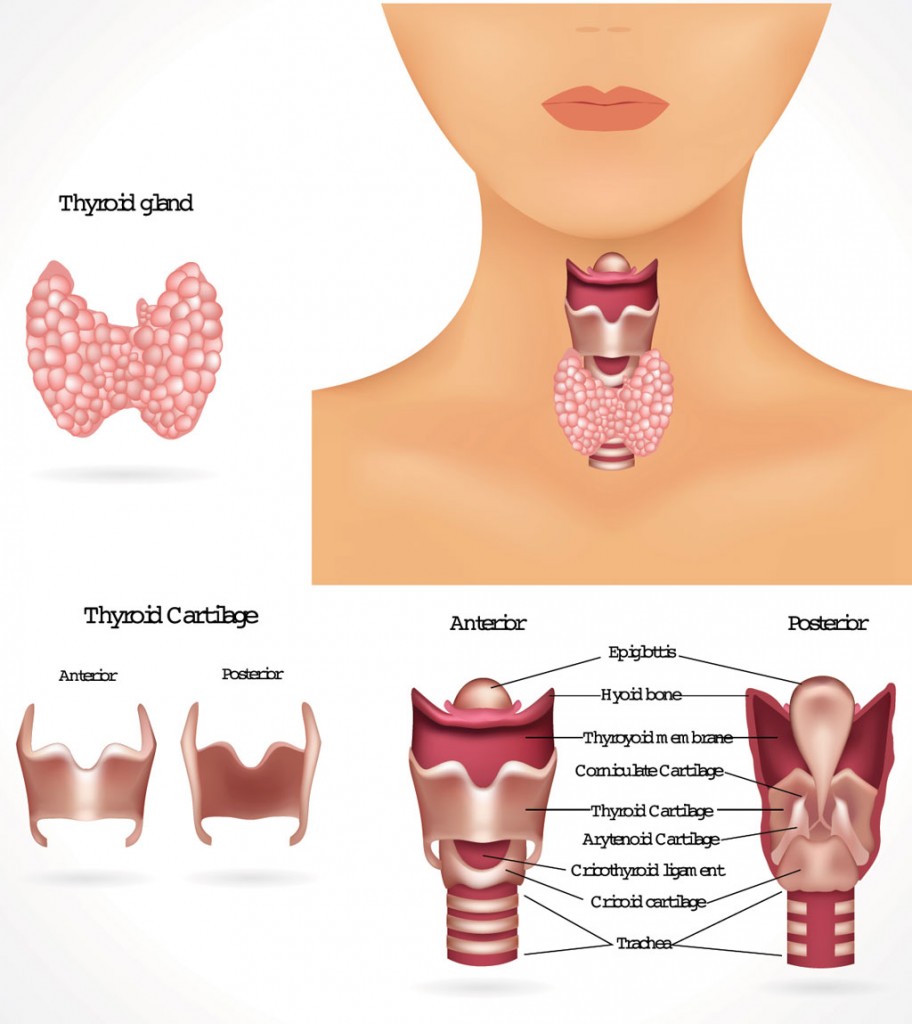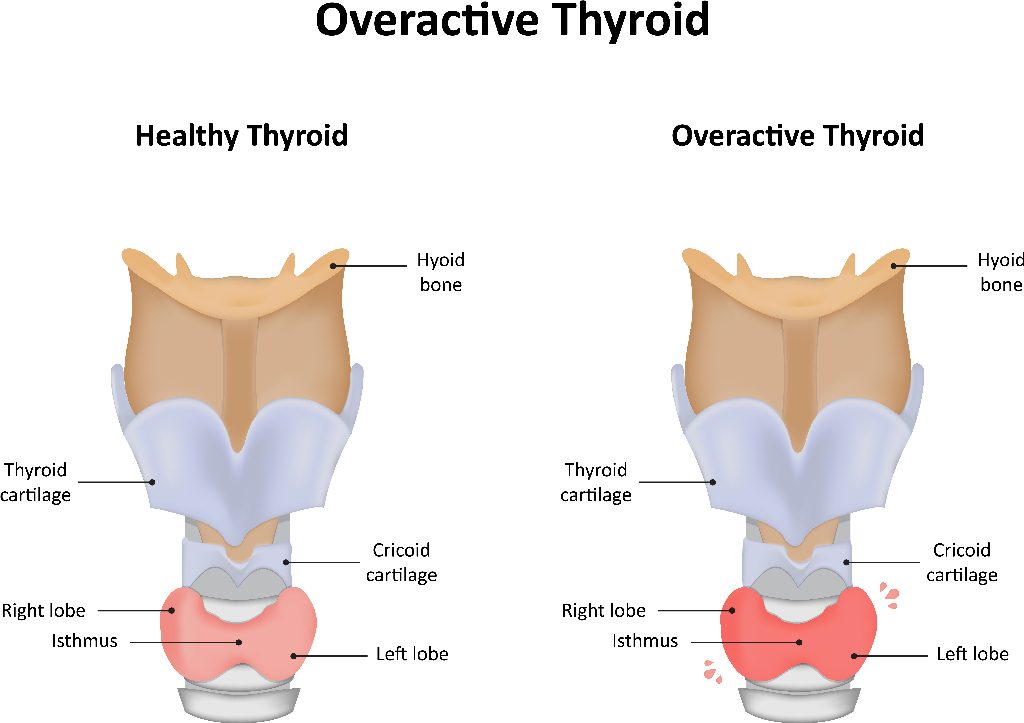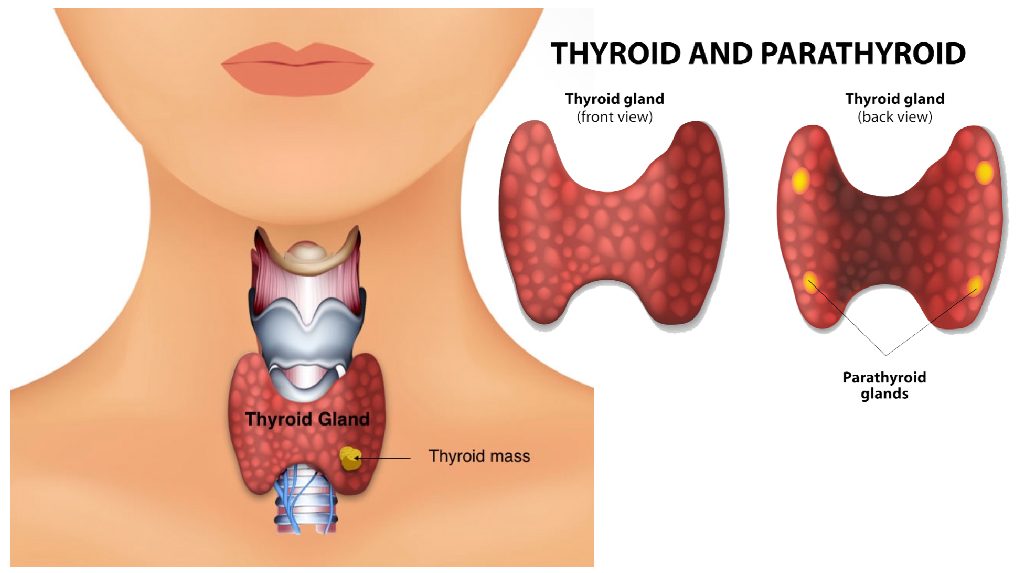In addition to treating common ear, nose, and throat conditions, Fort Worth ENT thyroid surgeons Dr. Jeremy Watkins, Dr. Brad McIntyre and Dr. Sean Callahan at the Fort Worth Thyroid Center also provides information and treatment on multiple thyroid disorders and thyroid disease. Thyroid disease is the result of an excess of thyroid hormone (hyperthyroidism) or an insufficient amount of thyroid hormone (hypothyroidism) being produced causing metabolic problems. Thyroid disorders can range from a harmless enlarged thyroid gland (goiter) to cancer.
Having an experienced thyroid surgeon reduces your risk of complications. Thyroid surgeons Dr. Jeremy Watkins, Dr. Brad McIntyre and Dr. Sean Callahan are experienced thyroid surgeons providing care to patients with thyroid disease in the Fort Worth, Dallas and surrounding metropolitan area.

Anatomy of the Thyroid Gland
The thyroid is a small butterfly-shaped gland located at the base of the neck along the front of the windpipe. The thyroid secretes several hormones know as thyroid hormones. Thyroid hormones influence many functions in the body, including metabolism, growth and development, heart rate, protein production and body temperature.
Thyroid Disorders
The thyroid is a small gland, but the hormones it produces have an enormous impact on the body. There are a number of thyroid disorders that can cause the gland to secrete too much or too little thyroid hormone. The imbalance that results has the potential to cause many symptoms and complications. While anyone can be affected by a thyroid disease, women are five times more likely than men to experience problems with the gland. In fact, one in eight women will develop a thyroid problem during her life. The most common thyroid disorders include:
- Hypothyroidism
- Hyperthyroidism
- Graves Disease
- Thyroiditis
- Postpartum Thyroiditis
- Goiter
- Thyroid Nodules
- Thyroid Cancer
Hypothyroidism
Hypothyroidism, also referred to as underactive thyroid, occurs when the thyroid does not produce enough of the thyroid hormones. When the level of these hormones is too low, the balance of chemical reactions in the body is upset and important functions are impacted.
Symptoms of Hypothyroidism
The signs and symptoms of hypothyroidism typically develop slowly. Symptoms may be very mild in the early stages, but over time, untreated hypothyroidism can cause a number of health problems. Symptoms of hypothyroidism vary depending on the severity of the hormone deficiency, but may include:
- Fatigue
- Sensitivity to cold, feeling cold when others do not
- Pale, dry skin
- Constipation
- Weight gain
- Puffy face
- Hoarse voice
- Heavy or irregular menstrual periods
- Thinning hair
- Slow heart rate
- Depression
- Impaired memory
- Muscle weakness
- Elevated blood cholesterol level
- Muscle aches, tenderness and stiffness
- Pain or stiffness in joints
Causes of Hypothyroidism
Hypothyroidism can result from a number of factors, including:
- Autoimmune disease: Autoimmune disorders cause the immune system to produce antibodies that attack the body’s own tissues. These antibodies can impair the thyroid’s ability to produce hormones.
- Hashimoto’s thyroiditis: Hashimoto’s is an autoimmune disease and is the most common cause of hypothyroidism.
- Treatment for hyperthyroidism: Occasionally, the medications used to treat an overactive thyroid can result in permanent hypothyroidism.
- Thyroid surgery: Certain conditions require the surgical removal of the thyroid or a portion of the thyroid. This can impair or prevent hormone production.
- Radiation therapy: Cancers are often treated with radiation. Treatment that involves the head or neck can damage the thyroid gland leading to hypothyroidism.
- Medications: There are many medications that can impact the function of the thyroid gland. Lithium, used to treat psychiatric disorders, is a medication known to cause underactive thyroid.
- Congenital disease: Sometimes babies are born with a thyroid that does not function correctly or with no thyroid at all.
- Pituitary disorder: In rare cases, hypothyroidism is caused when the pituitary glad fails to produce enough thyroid-stimulating hormone (TSH).
Treatment for Hypothyroidism
Fortunately, once diagnosed, hypothyroidism is extremely treatable. Typically, medication is taken to correct the levels of thyroid hormone in the body. Man-made forms of the hormones produced by the thyroid gland make up for the missing hormones and allow the body to function normally. Most individuals need to take these medications for life.
Hyperthyroidism
Hyperthyroidism, or overactive thyroid, is a thyroid disease in which the thyroid gland produces more of the thyroid hormone thyroxin than the body needs. This speeds up many functions of the body such as metabolism and heart rate.
Signs and Symptoms of Hyperthyroidism
Hyperthyroidism can cause a wide range of symptoms, including:
- Sudden or rapid, unexplained weight loss
- Increased appetite
- Rapid or irregular heartbeat
- Feeling nervous or anxious
- Irritability
- Difficulty sleeping
- Tremor, trembling in your hands and fingers
- Increased sweating
- Feeling hot
- Muscle weakness
- Diarrhea or frequent bowel movements
- Lighter and fewer menstrual periods
- Redness, irritation or bulging of the eyes
- Fine, brittle hair
- Thinning skin
Causes of Hyperthyroidism
There are a number of factors that can cause the thyroid to produce too much of the thyroid hormones, including:
- Graves’ disease: The most common cause of hyperthyroidism, Graves’ disease, is an autoimmune disorder in which antibodies attach the thyroid gland causing it to produce too much T-4 hormone.
- Thyroiditis: Sometimes the thyroid gland can become inflamed causing excess thyroid hormone to leak into the bloodstream.
Treatment for Hyperthyroidism
There are several options of treatment of hyperthyroidism. Fort Worth ENT will select the best treatment based on age, physical condition and the severity of the overactive thyroid.
- Radioactive iodine: Radioactive iodine is taken orally and absorbed by the thyroid gland. It causes the gland to shrink and thyroid activity to slow. Symptoms typically subside in 3 to 6 months, but often an underactive thyroid results.
- Anti-thyroid medications: These medications prevent the thyroid from producing excess amounts of hormones. For some people, anti-thyroid medications permanently correct the disorders. Other may experience a relapse. Liver damage is a risk with these medications.
- Beta-blockers: These medications do not affect thyroid function, but instead, provide symptom relief. Beta-blockers can effectively reduce heart rate and prevent palpitations.
- Surgery: When other treatments cannot be tolerated, surgery (thyroidectomy) is the next option. All or most of the thyroid is removed, and the procedure results in permanent hypothyroidism.
Thyroiditis
Thyroiditis is inflammation or swelling of the thyroid, and occurs when the body’s immune system makes antibodies that attack the thyroid. Thyroiditis can cause either abnormally high or abnormally low levels of thyroid hormones in the blood. Hashimoto’s Disease and Postpartum Thyroiditis are two types of thyroid inflammation.
Causes of Thyroiditis
Inflammation of the thyroid can be caused by factors such as:
- Autoimmune diseases
- Viral or bacterial infection
- Certain medications
Postpartum Thyroiditis
In about 10% of women, a previously normal thyroid gland becomes inflamed in the month following delivery.
Symptoms of Postpartum Thyroiditis
Because the symptoms of postpartum thyroiditis can be very similar to the “baby blues” that sometimes follow delivery, the condition often goes undiagnosed.
Most women experience two phases of postpartum thyroiditis. First, the inflammation causes release of thyroid hormone and mild signs and symptoms of overactive thyroid develop. This typically occurs 1 to 4 months after delivery and lasts for a few months. Symptoms may include:
- Rapid heart rate and palpitations
- Weight loss
- Anxiety and irritability
- Increased sensitivity to heat
- Fatigue
- Tremor
- Difficulty sleeping
In the next stage, symptoms of underactive thyroid begin to occur as the gland becomes damaged. This begins 4 to 8 months after delivery and typically last for 9 – 12 months. Symptoms include:
- Weight gain
- Slow heart rate
- Dry skin
- Feeling cold
- Depression
- Lack of energy
- Muscle and joint aches
Causes of Postpartum Thyroiditis
The exact cause of postpartum thyroiditis is not known. Factors such as having an underlying autoimmune disease, a personal or family history of thyroid disorders, chronic viral hepatitis or previously experiencing postpartum thyroiditis can all increase the risk of developing this condition.
Treatment of Postpartum Thyroiditis
Treatment for postpartum thyroiditis depends on the stage of the condition and the symptoms. Most women experiencing mild symptoms of hyperthyroidism or hypothyroidism don’t need treatment. However, your doctor will monitor your thyroid function closely through blood test. Typically, with postpartum thyroiditis, thyroid function returns to normal and symptoms subside 12 to 18 months after the onset. If symptoms are severe during either stage or if other complications result, treatment for overactive or underactive thyroid may be necessary.
Goiter (Enlarged Thyroid Gland)
A goiter is an unusually enlarged thyroid gland. This occurs more often in women than in men, especially in women before menopause.
Symptoms of a Goiter
Typically, swelling in the neck is the only symptom of a goiter. If the goiter is large, you may be able to feel it or even see the lump. For some people, a large goiter may cause a tight feeling in the throat, a cough, or even difficulty swallowing and breathing.
Causes of a Goiter
The reason a goiter develops is not always known, but some likely causes include:
- Hashimoto’s disease
- Graves’ disease
- Thyroid nodules
- Thyroiditis
- Thyroid cancer
Treatment for a Goiter
Treatment depends on the underlying cause of the goiter. In many cases, goiters resolve without any treatment. If the thyroid is functioning normally and symptoms are not bothersome, treatment may not be needed. If the large thyroid does cause complications, medication can be used to shrink the gland or surgery can be performed to remove it.
Thyroid Nodules
Thyroid nodules are lumps that form on the thyroid. They can be solid or fluid-filled, and the majority of nodules do not cause symptoms or complications. If large enough, some nodules can be visible and even make it hard to swallow and breathe. Most thyroid nodules, however, go unnoticed until discovered in a routine exam.
Symptoms of Thyroid Nodules
The great majority of thyroid nodules do not cause any symptoms. Occasionally, nodules may cause the thyroid gland to produce too much thyroid hormone, thyroxin, causing symptoms of hyperthyroidism, such as:
- Weight loss
- Rapid heart rate
- Anxiety and nervousness
- Tremor
- Sensitivity to heat
Causes of Thyroid Nodules
There are several conditions that can cause thyroid nodules to develop, including:
- Thyroid adenoma: This is a noncancerous growth and does not typically cause symptoms unless extremely large. Some types do cause hyperthyroidism.
- Iodine deficiency: Iodine deficiency can cause nodules to develop, but it is extremely rare to see iodine deficiency in the United States.
- Thyroiditis: Thyroid inflammation can result in nodular enlargement.
- Thyroid cyst: Usually benign, these fluid-filled cavities often result from degenerating thyroid adenomas.
- Thyroid cancer: While rare, sometimes thyroid nodules are malignant. Nodules that are hard or cause pain are more concerning.
Treatment of Thyroid Nodules in Thyroid disease
Thyroid disease treatment depends on the type of nodule and their symptoms:
- Watchful waiting: If your nodule is not cancerous, this is typically the first step in treatment. Regular physical exams, blood tests, and perhaps thyroid ultrasound tests will be performed. If no changes occur, further treatment may not be necessary.
- Surgery: Surgery may be necessary when nodules are potentially cancerous or for large nodules that cause problems breathing or swallowing.
- Radioiodine: When nodules cause the thyroid to produce too much hormone, radioiodine treatment is helpful in shrinking the nodules and decreasing hormone production.

Thyroid Cancer
Thyroid cancer develops in the cells of the thyroid gland. When cells undergo genetic mutations, they can grow and multiply rapidly. The abnormal cells accumulate and can form a tumor. Abnormal cells can also spread to nearby tissue and throughout the body. While thyroid cancer is not common, the rate of occurrence is increasing. Three times as many women are diagnosed with thyroid cancer than men, and most are between the ages of 25 and 65. The risk of thyroid cancer also increases with family history of thyroid cancer, history of goiter, or history of head and neck radiation. There are several types of thyroid cancer:
- Papillary thyroid cancer: This is the most common form of thyroid cancer and typically affects people between the ages of 30 and 50.
- Follicular thyroid cancer: This form of cancer develops from follicular cells of the thyroid, and is usually seen in people older than 50.
- Medullary thyroid cancer: This cancer is found in the C cells of the thyroid that produce calcitonin.
- Anaplastic thyroid cancer: Rare and rapidly growing, anaplastic thyroid cancer can be more difficult to treat.
- Thyroid lymphoma: This cancer develops in the immune system cells of the thyroid. It is rare and grows quickly making it difficult to treat.
Symptoms of Thyroid Cancer
In the early stages, thyroid cancer typically causes no symptoms. As the cancer grows the following symptoms may develop:
- A lump, nodule or goiter that can be felt
- Increased hoarseness or changes to the voice
- Pain in the neck or throat
- Difficulty swallowing
- Swollen lymph nodes
Treatment of Thyroid Cancer
Most forms of thyroid cancer are typically very treatable. The course of treatment depends on a number of factors including type of cancer, stage of cancer, and age.
Surgery is the standard treatment for thyroid cancer. A thyroidectomy is performed to remove the gland. When the cancer is small and has not spread, this treatment alone can cure the cancer. Radioactive iodine is often used following surgery to destroy any remaining tissue that was not removed during the procedure. Other treatments that may be necessary include external radiation therapy, chemotherapy, and targeted drug therapy.
Diagnosing Thyroid Disease
It can be hard to diagnose thyroid disease. Symptoms of thyroid disease vary greatly and many of the signs and symptoms are very similar to other conditions and health issues. After assessing health history and family history, the first test is a physical exam where your physician will check your neck for enlargement of the gland and for thyroid nodules. Depending on your symptoms, your doctor may also do other tests, such as:
- Blood tests: Testing the level of thyroid stimulating hormone (TSH) in your blood can help determine if the thyroid is overactive or underactive.
- Radioactive iodine uptake test: A small dose of radioactive iodine (radioiodine) is swallowed. If high levels of radioiodine are seen in the thyroid, it is likely making too much thyroid hormone. Low levels mean that the thyroid is not making enough.
- Thyroid scan: Using radioiodine, a special camera makes an image of your thyroid on a computer screen. This test shows the pattern of iodine uptake in the thyroid and identifies different types of nodules.
- Thyroid ultrasound: This test can help identify what type and size of nodule is present. More ultrasounds may be needed over time to see if the nodule is growing or shrinking.
- Thyroid fine needle biopsy: This test determines whether thyroid nodules have normal cells in them. A very thin needle is inserted into the thyroid to take out a sample of cells and fluid. A doctor will then look at the cells under a microscope to see if there are any abnormal cells that could be thyroid cancer.
Complications of Thyroid Disease
When left untreated, there are numerous complications of thyroid disease. Hypothyroidism that is not controlled can eventually lead to the following complications:
- Heart problems
- Mental health issues
- Peripheral neuropathy
- Myxedema
- Infertility
- Birth defects
Untreated hyperthyroidism can lead to complications such as:
- Heart problems
- Brittle bones
- Eye problems
- Thyrotoxic crisis
Thyroid Surgery
The experienced surgeons at Fort Worth ENT perform minimally invasive thyroid surgery. The procedure is necessary to treat thyroid cancer, thyroid nodules, Grave’s disease and hyperthyroidism that cannot be treated with medication or radioiodine. There are several methods of thyroid surgery, in which all or part of the thyroid gland is removed.
Total thyroidectomy: This procedure removes all of the thyroid gland and the surrounding lymph nodes. This surgery is typically recommended for thyroid cancer and sometimes Grave’s disease. Studies have shown that a total thyroidectomy significantly reduces the rate of recurrence or relapse over other surgical methods and produces fast results.
Subtotal thyroidectomy: When the surgeon removes almost the entire thyroid, it is known as a subtotal or near total thyroidectomy. This procedure is sometimes done to treat hyperthyroidism caused by Grave’s disease, however, research now shows that total thyroidectomy may be the best option.
Thyroid lobectomy: This procedure is done when thyroid nodules are located on only one lobe of the thyroid and either the left or right lobe is removed. Usually the remaining lobe can compensate hormonally for the entire function of the thyroid gland. If the nodules are found to have cancer cells, a total thyroidectomy will be performed.
Minimally invasive thyroid surgery: This surgery is the most up-to-date form in which a tiny scope is used, which means less scarring and faster recovery.
As with any surgery, there are risks, but thyroid surgery is generally a very safe procedure. Complications such a bleeding, hoarseness or voice changes, or damage to the parathyroid glands can occur.
Following a thyroidectomy, hypothyroidism results. Thyroid hormone therapy is necessary for life to replace the missing hormones. It may take some time to find the right dosage. Typically, blood tests are performed every few months until the right dosage is found, and then annually to monitor the levels.
If you would like an appointment with one of our physicians at Fort Worth ENT & Sinus please complete an online appointment request or phone 817-332-8848.
Frequently Asked Questions
You should see a thyroid specialist if you have persistent symptoms despite medication, a thyroid nodule or lump, abnormal imaging results, recurrent thyroid disease, or if surgery has been recommended. ENT thyroid surgeons are especially helpful when nodules, voice changes, swallowing difficulty, or possible cancer are involved.
Not all thyroid nodules require surgery. Surgery may be recommended if a nodule is cancerous or suspicious, causes trouble breathing or swallowing, continues to grow, or produces excess thyroid hormone. Fine needle biopsy, ultrasound findings, and symptom severity all help determine the best course of treatment.
Temporary voice changes are possible after thyroid surgery due to irritation near the vocal cords, but permanent voice damage is uncommon, especially when surgery is performed by experienced thyroid surgeons. Most patients notice improvement within weeks as swelling resolves.
Most patients return home the same day or after one night in the hospital. Normal daily activities can usually resume within 1–2 weeks. Minimally invasive thyroid surgery often results in smaller incisions, less discomfort, and faster recovery compared to traditional approaches.
Some thyroid conditions are temporary and resolve on their own or with short-term treatment. Others, such as hypothyroidism after thyroidectomy or autoimmune thyroid disease, require lifelong monitoring and medication. With proper treatment, most patients live healthy, normal lives.




